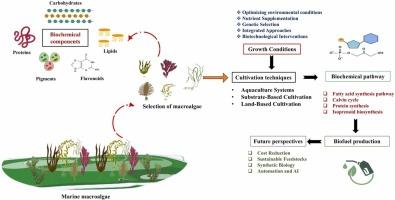当前位置:
X-MOL 学术
›
Ind. Crops Prod.
›
论文详情
Our official English website, www.x-mol.net, welcomes your
feedback! (Note: you will need to create a separate account there.)
Biofuel production from marine macroalgae: Pathways, technologies, and sustainable energy solutions
Industrial Crops and Products ( IF 5.6 ) Pub Date : 2024-12-13 , DOI: 10.1016/j.indcrop.2024.120282 R.V. Hemavathy, Y.P. Ragini, S. Shruthi, S. Ranjani, S. Subhashini, P. Thamarai
Industrial Crops and Products ( IF 5.6 ) Pub Date : 2024-12-13 , DOI: 10.1016/j.indcrop.2024.120282 R.V. Hemavathy, Y.P. Ragini, S. Shruthi, S. Ranjani, S. Subhashini, P. Thamarai

|
The increasing global energy demand, along with growing environmental concerns, has accelerated the search for renewable energy sources. Marine macroalgae, also known as seaweeds, have gained significant attention for their potential to address these challenges due to their rapid growth, high carbohydrate content, and absence of lignin, which simplifies biofuel production. This review hypothesizes that marine macroalgae offer a more sustainable and economically viable alternative to conventional biofuel sources due to their unique biochemical properties and ecological benefits. The objective of this review is to assess the potential of seaweed-based biofuels, focusing on their role in energy conservation, climate change mitigation, and environmental sustainability. The study highlights macroalgae's carbohydrates and lipids, essential for biodiesel and bioethanol production. A comprehensive analysis of macroalgae cultivation techniques and biorefinery processes is presented, exploring whether optimized processing methods can enhance biofuel yields while minimizing environmental impacts. Additionally, the paper now incorporates life cycle assessment (LCA) and meta-analysis approaches to evaluate the environmental and economic feasibility of macroalgae-based biofuels. Methods for processing macroalgae biomass are discussed. Additionally, the paper reviews the ecological benefits of macroalgae cultivation, such as carbon sequestration (CS), which helps reduce greenhouse gas (GHG) emissions and promotes marine conservation. The transition to sustainable energy solutions is facilitated by the insights it provides into agriculture and processing techniques.
中文翻译:

海洋大型藻类的生物燃料生产:途径、技术和可持续能源解决方案
不断增长的全球能源需求以及日益增长的环境问题加速了对可再生能源的寻找。海洋大型藻类,也称为海藻,由于其生长迅速、碳水化合物含量高且不含木质素而因其应对这些挑战的潜力而受到广泛关注,这简化了生物燃料的生产。本综述假设海洋大型藻类由于其独特的生化特性和生态效益,为传统生物燃料来源提供了一种更可持续和经济可行的替代品。本综述的目的是评估基于海藻的生物燃料的潜力,重点关注它们在节能、减缓气候变化和环境可持续性方面的作用。该研究强调了大型藻类的碳水化合物和脂质,这对生物柴油和生物乙醇生产至关重要。对大型藻类培养技术和生物精炼工艺进行了全面分析,探讨了优化的加工方法是否可以提高生物燃料产量,同时最大限度地减少对环境的影响。此外,该论文现在结合了生命周期评估 (LCA) 和荟萃分析方法来评估基于大型藻类的生物燃料的环境和经济可行性。讨论了处理大型藻类生物质的方法。此外,本文还回顾了大型藻类培养的生态效益,例如碳封存 (CS),这有助于减少温室气体 (GHG) 排放并促进海洋保护。它提供的对农业和加工技术的见解促进了向可持续能源解决方案的过渡。
更新日期:2024-12-14
中文翻译:

海洋大型藻类的生物燃料生产:途径、技术和可持续能源解决方案
不断增长的全球能源需求以及日益增长的环境问题加速了对可再生能源的寻找。海洋大型藻类,也称为海藻,由于其生长迅速、碳水化合物含量高且不含木质素而因其应对这些挑战的潜力而受到广泛关注,这简化了生物燃料的生产。本综述假设海洋大型藻类由于其独特的生化特性和生态效益,为传统生物燃料来源提供了一种更可持续和经济可行的替代品。本综述的目的是评估基于海藻的生物燃料的潜力,重点关注它们在节能、减缓气候变化和环境可持续性方面的作用。该研究强调了大型藻类的碳水化合物和脂质,这对生物柴油和生物乙醇生产至关重要。对大型藻类培养技术和生物精炼工艺进行了全面分析,探讨了优化的加工方法是否可以提高生物燃料产量,同时最大限度地减少对环境的影响。此外,该论文现在结合了生命周期评估 (LCA) 和荟萃分析方法来评估基于大型藻类的生物燃料的环境和经济可行性。讨论了处理大型藻类生物质的方法。此外,本文还回顾了大型藻类培养的生态效益,例如碳封存 (CS),这有助于减少温室气体 (GHG) 排放并促进海洋保护。它提供的对农业和加工技术的见解促进了向可持续能源解决方案的过渡。






























 京公网安备 11010802027423号
京公网安备 11010802027423号